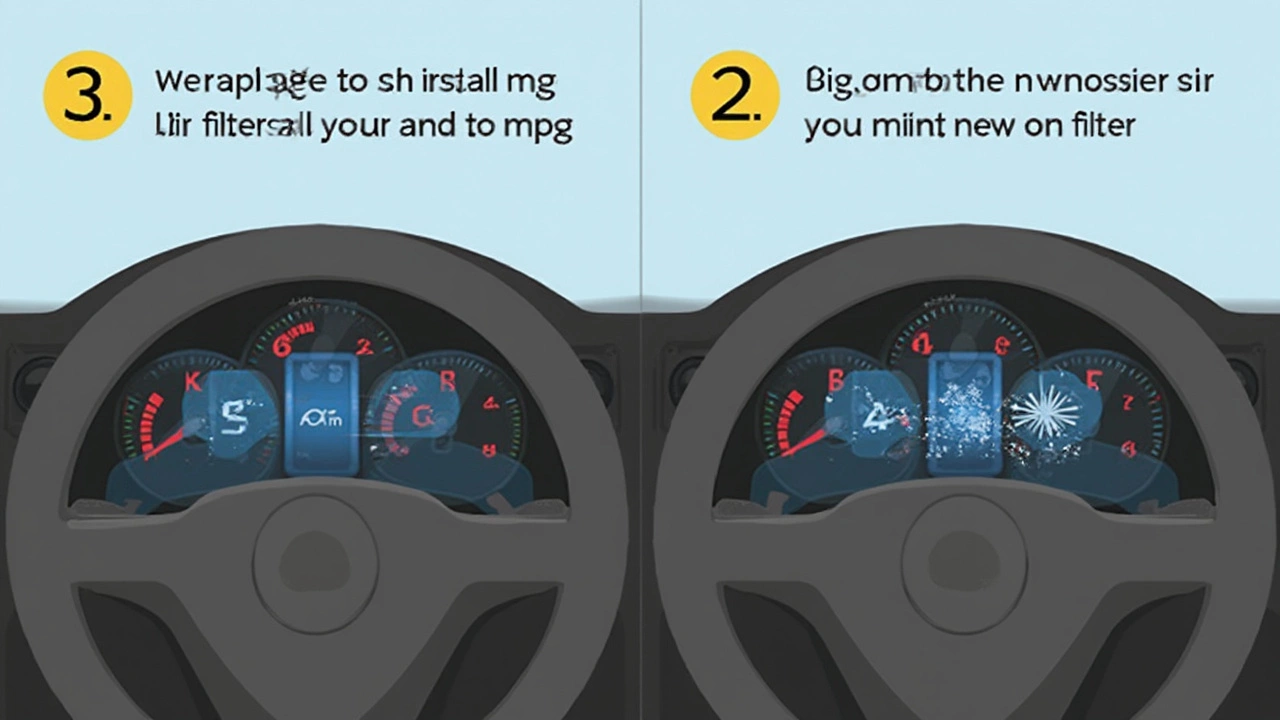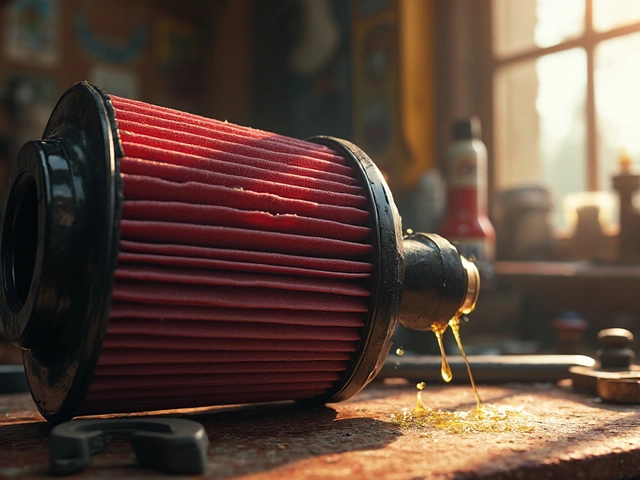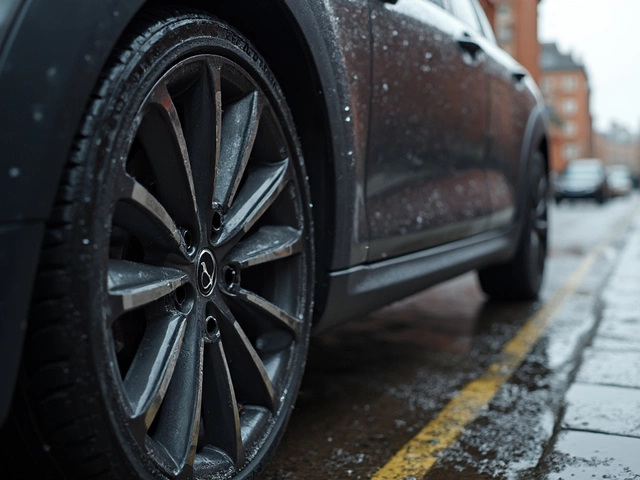Pop quiz: Would you spend $40 if it meant filling up your gas tank less? Most drivers hear about “high-performance” air filters from auto shops or see bold claims on the box—things like “improves fuel economy,” “boosts horsepower,” and “saves money at the pump.” But do those shiny filters actually nudge your miles per gallon higher, or is it just marketing magic? Lots of car owners have wondered if swapping out a basic air filter for a fancier one will actually save them anything—or if it’s just a bunch of hot air.
How Air Filters Work and Why They Matter
Air filters sit quietly under your car’s hood, but their job isn’t small. Think of an air filter as your engine’s face mask. Every drive, your engine sucks in air to mix with fuel. Bug guts, dust, pollen, and even the occasional leaf are all trying to sneak in. The filter grabs those little nasties so only clean air enters your engine. Without it, crap could clog things up and cause expensive trouble.
Here’s a wild stat: A four-stroke engine gobbles up about 9,000 liters of air just to burn one liter of fuel. All that air has to pass through the filter. If the filter is old and clogged, your engine has to “work out” harder just to breathe. That’s not good for fuel economy, power, or your wallet.
But what about “performance” or “high-flow” air filters? These are usually made from cotton gauze or foam instead of regular old paper. They’re designed to let more air zip through. The idea is, more oxygen means better combustion—and in theory, that could mean better fuel efficiency. People pay extra for reusable filters they can clean instead of replace. But is that actually giving them better mpg, or just a peace-of-mind placebo?
Can Switching to a Better Air Filter Actually Improve MPG?
Here’s the blunt truth: A filthy, clogged air filter will wreck your mpg, no debate there. The US Department of Energy (DOE) says replacing a blocked filter on a carbureted car can boost fuel economy by up to 10%. For newer cars with fuel injection and onboard sensors, the difference isn’t as dramatic, but a bad filter can still drag things down. Modern cars can kind of “work around” a dirty filter, but it's like running laps with a clothespin on your nose—not ideal.
Brand-new versus “performance” filters, though? The numbers aren’t so flashy. Multiple real-world tests, like the ones from Consumer Reports and SAE International, show that swapping a clean OEM filter for a performance type rarely shows any measurable jump in mpg for most daily drivers. The reason? Most factory filters already allow enough airflow for how most people use their cars. Unless you’re racing, towing, or driving at high altitude, you may not notice a difference.
But here’s the sneaky bit: Clogged filters can affect older cars more. A 2009 AAA field study found that replacing a dirty air filter on older, carbureted vehicles could lead to savings up to $0.20 per gallon. On newer engines with advanced computer controls, that benefit shrinks to pennies—or even nothing.
What the Science and Experts Say About Air Filters and Fuel Efficiency
Cut through the marketing noise, and you’ll find that nearly every major auto expert and study says the same thing. For example, SAE (the Society of Automotive Engineers) tested several high-performance filters against standard ones on modern, fuel-injected cars. They found almost zero difference in mpg or power under normal driving conditions. The big exception? Extreme cases where the original filter was seriously clogged—then, replacing it (with any clean filter) helped.
Here’s a quick look at how dirty air filters impact old versus new rides:
| Vehicle Type | Effect of Dirty Air Filter | MPG Change with Clean Filter |
|---|---|---|
| Older Carbureted Cars | Performance drops, mpg tanks | Increase by up to 10% |
| Modern Fuel-Injected (Post 1996) | ECUs adjust airflow, minor effect | 0-2% increase |
One oddball: High-performance filters might allow *slightly* more airflow when you’re pushing the engine hard, like during racing or towing uphill. That’s where some drivers report a small gain in power or acceleration—and maybe, just maybe, a tick up in mpg. But it’s not something most commuters will feel.

Pros and Cons of Different Air Filter Types
If you’re still tempted, here’s the lowdown. Paper filters are disposable, cheap, and they do the job for most drivers. Cotton or foam high-flow filters can be cleaned and reused dozens of times, which is good for the planet (less landfill waste) and might save cash after a few years—if you keep your vehicle that long.
Reusable filters often need a smidge more maintenance. If you don’t re-oil them properly after cleaning, they can let too much dirt sneak through (bad for your engine sensors). Some mechanics also grumble about oil from these filters “gumming up” sensors, which can actually make your car run worse. The upfront cost is another thing: a performance filter could cost $50+, compared to under $20 for plain old paper.
- Air filter swaps, even with fancy models, won’t magically turn your Camry into a hybrid or give you racecar mpg.
- For turbocharged or tuned cars, a high-flow filter might actually help—but expect small gains unless you’re pairing it with other upgrades, like a new exhaust or remapped ECU.
- Poor engine sealing (like a cracked intake) can make any kind of filter useless, so always check for loose hoses or holes before blaming the filter.
The best-case scenario for most folks: Stick with a quality filter, change it on schedule, and don’t stress about “performance” unless you’re modding.
Tips to Boost MPG Beyond Fancy Air Filters
Okay, you want better mileage? Sure, an air filter helps—but so do a bunch of things most people overlook. Want quick wins? Try these everyday tweaks:
- Keep your tires inflated. Low tire pressure kills mpg faster than you’d think.
- Use the right oil. That thick, gunky stuff drags your engine down. Use what your manual says.
- Don’t snooze on spark plugs. New spark plugs can help you burn fuel smarter.
- Lighten the load. Ditch the junk in your trunk and remove roof racks if you’re not using them.
- Chill with the gas pedal. Fast starts and stops waste heaps of fuel.
- Follow maintenance schedules. Air filters matter—just don’t treat them like magic. Change them every 12,000–15,000 miles, or as your manual says.
If you’re hunting for actual cash-in-your-pocket savings, these steps add up. Changing a *bad* filter is helpful, but chasing tiny mpg boosts from fancy filters? Don’t expect huge miracles.
Should You Upgrade Your Car’s Air Filter for Better MPG?
Bottom line: For most folks, swapping a clean factory air filter for an expensive “performance” one won’t make a real difference at the gas pump. If your current filter is dirty or clogged, yes, you could see a sweet jump in mpg just by changing it. But the same thing happens with a fresh standard filter—no need to break the bank on high-tech gear unless you’re genuinely into modifying your ride for track days or hauling trailers.
One last tip: Don’t ignore your air filter. Check it every oil change. If it looks gross, swap it out. Handy drivers can do this in ten minutes with a screwdriver and a clean rag. If you do want to experiment with a performance filter, read the fine print and keep up with maintenance. And if all you really want is to spend less at the pump? Start with your right foot, not just under the hood.




